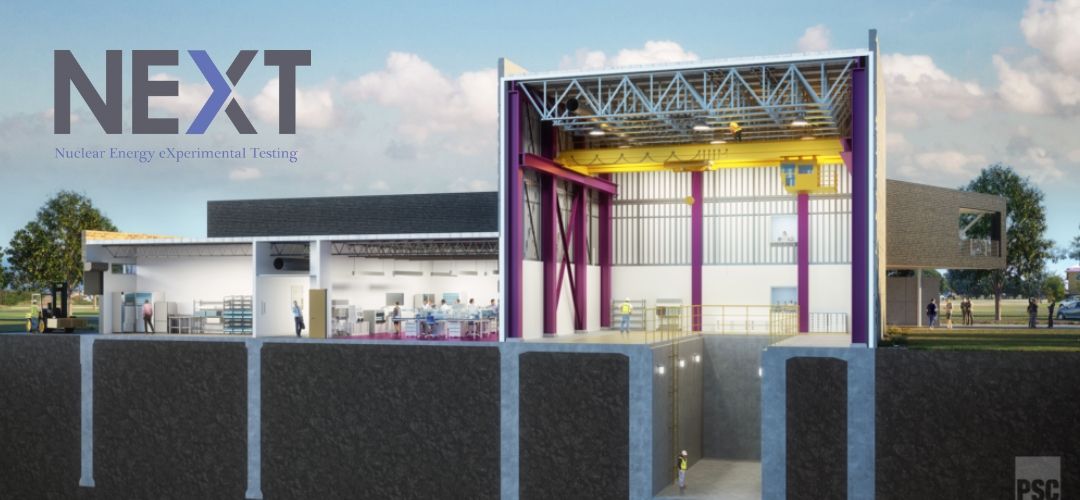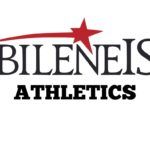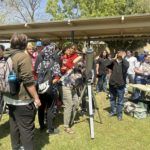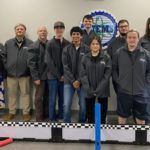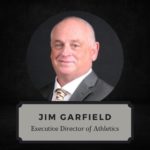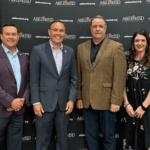Abilene Christian University is currently building The Gayle and Max Dillard Science and Engineering Research Center, which will eventually house a molten salt nuclear reactor that could provide life-changing discoveries for clean water, affordable energy, and breakthroughs in cures for cancer.
And Abilene ISD students are already making an impact on the research.
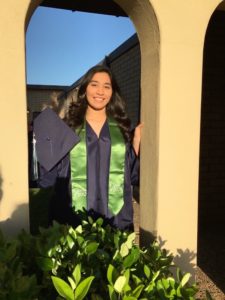 ATEMS graduates Bertha Sanchez, a junior at ACU, and freshmen John Stai and Aiden Boisvert are just three of a group of Abilene ISD alums who are working on the project, which is set to go fully online in late 2025 or early 2026. Three years ago, ACU was granted $21.5 million to conduct research into advanced molten salt reactors. ACU has also committed to building a 28,000-square-foot facility – at a cost of $23 million – that will include a 6,000-square-foot research bay that will house the molten salt reactor.
ATEMS graduates Bertha Sanchez, a junior at ACU, and freshmen John Stai and Aiden Boisvert are just three of a group of Abilene ISD alums who are working on the project, which is set to go fully online in late 2025 or early 2026. Three years ago, ACU was granted $21.5 million to conduct research into advanced molten salt reactors. ACU has also committed to building a 28,000-square-foot facility – at a cost of $23 million – that will include a 6,000-square-foot research bay that will house the molten salt reactor.
Using molten salt and a small amount of low-enriched uranium, the reactor could provide global solutions to the world’s need for energy, water, and medical isotopes by advancing the technology of molten salt reactors. The opportunity to work on the reactor was a major reason that both Sanchez and Stai chose ACU when it came time to settle on their choice of higher education.
“I had applied to a lot of universities – including ACU – during my senior year at ATEMS,” Sanchez said, “but I loved the goal of the NEXT Lab project and the possibility of being an undergraduate student that would impact the project.”
Stai had a similar story, but it was also about having the opportunity to get hands-on experience working in the lab that pushed him to ACU.
“I saw it as a rare opportunity to not only build my resume but to experience a real engineering work environment,” Stai said. “It’s my best chance to discover whether or not I want to take on engineering as a career.”
After working with the NEXT Lab the summer prior to her first year at ACU, Sanchez was placed with the Fluoride Molten Salt Test Loop (FMSTL) group as a freshman, working with an upperclassman to assemble and create a gas-blanket system, giving the reactor the ability to control the salt the way the system intended.
She’s also been involved in construction, maintenance, experiments, planning, research, and other projects related to the NEXT Lab. She said her time at ATEMS got her ready from a mental aspect for what she would be doing at ACU.
“I went to ATEMS because I was curious about engineering, and ATEMS gave me an understanding of what it was and inspired me to pursue it,” Sanchez said. “The thing of value I received from ATEMS was the mentality to do this. ATEMS helped me learn the skills of time management, organization, and quality. Without the expectations and teaching styles of the teachers, I wouldn’t have gained those skills that have allowed me to be where I am today. Character, hard work, and a desire to learn is all you need for the future.”
Like Sanchez, Stai also said the curriculum at ATEMS prepared him for his time at ACU where, as a research engineer, he has been to the Molten Salt Test Systems (MSTS) group. That MSTS is a proof of concept for NEXT’s molten salt reactor. Stai’s role is to create and edit Computer-Aided Design (CAD) models and drawings for various subsystems of the MSTS, as well as any other engineering-related work such as drafting lab procedures, testing components, and outsourcing hardware.
“The engineering curriculum at ATEMS is an outstanding precursor to engineering work,” Stai said. “Knowing the basics of Inventor has been a major foothold in my success at NEXT. Specifically, the projects and tasks from Mrs. (Allison) Stanley’s Engineering Design and Development (EDD) class were the most pertinent to the work that I do. Everything we did in her class I’ve had to do again and again in the field.”
Dr. Rusty Towell, professor of engineering and physics at ACU and the Director of the NEXT Lab, is a 1986 graduate of Abilene High School and believes that giving students hands-on experiences makes for the best academic experience.
“What changed me as an undergraduate at ACU was the opportunity to work on real-world problems, work with world-class equipment, and work alongside a Christian mentor who was an expert in the field,” said Towell, who has spoken about physics and nuclear energy across the globe and authored more than 50 journal articles on those subjects. “The NEXT Lab is providing this opportunity to more than 60 students at any given time with hundreds total who have had this experience.
“Many NEXT students, staff, and faculty members began their education in the Abilene ISD before joining this project,” he said. “When students are given the opportunity to learn science, engineering, and math at an early age, they are better prepared to join NEXT and make an impact. I’m thankful for my education from Abilene High, and many of our students have benefitted from ATEMS and, more recently, all the great things happening at The LIFT.”

